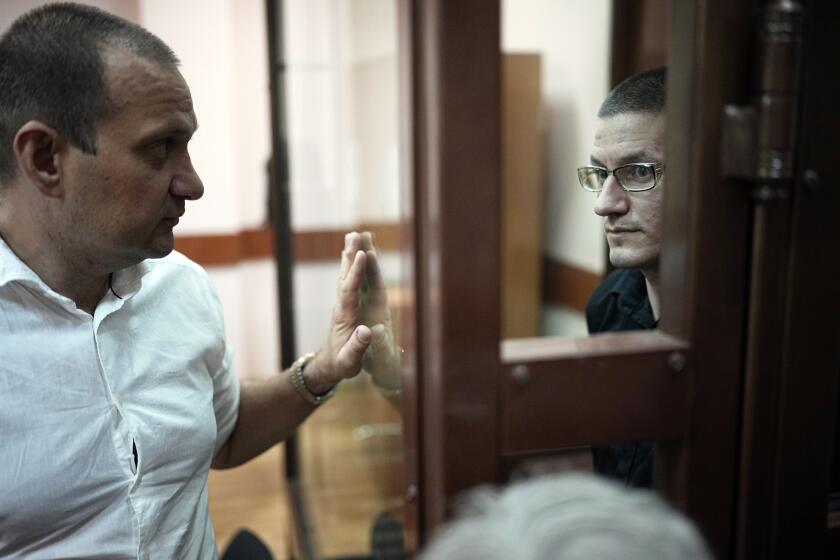Azerbaijani novelist vilified for his call for reconciliation
MOSCOW — His books were burned by a mob in Azerbaijan’s second-largest city. His wife and son have lost their jobs. A crowd in a small town demanded that his blood be tested to establish his true ethnicity. The nation’s president stripped him of his honorary title as “the People’s Writer.” And an infuriated mob under his window made threats against his life and told him to leave the country.
Akram Aylisli, 75, says the treatment he has received since publication of the Russian translation of his latest book, “Stone Dreams,” defies even his own literary imagination.
The book describes outbreaks of ethnic violence in Azerbaijan, then a Soviet republic, in the waning days of the Soviet Union. Subsequently, at least 30,000 ethnic Armenians and Azerbaijanis died in four years of fighting over the mountainous enclave of Nagorno-Karabakh, where Armenian troops are still stationed.
“My book has nothing to do with politics,” Aylisli said in a phone interview from his home in Baku, the capital. “It simply calls upon both Armenians and Azerbaijanis to repent for their past sins and try to turn over a new leaf in the history of their centuries-old relationship.”
Instead, since the Russian translation of the book was carried in the December issue of the Friendship of Peoples journal — published in Moscow — Aylisli’s life has been a living hell.
On Feb. 7, Azerbaijani President Ilham Aliyev issued two decrees stripping the author of the honorary title of the People’s Writer, awarded in 1998. He also deprived Aylisli of a monthly stipend of about $1,270.
“In this novel written in a style alien to the spirit of our people, the author tries to form an anti-humane image of the Azerbaijani people and unjustifiably to blame them for acts contradictory to universal human values, distorting the essence of the Armenian-Azerbaijani Nagorno-Karabakh conflict, painting black our distant and recent past,” says one of the decrees.
A Russian literary editor said he doubted that Aliyev and protesting Azerbaijanis had even read the book.
“This book in a most humane way tries to study the nature of such an ugly phenomenon as inter-ethnic hatred and certainly possesses none of the qualities attributed to it in Aliyev’s decree,” said Leonid Bakhnov, head of the prose department at the Russian journal.
“The whole story with Aylisli reminds me of the harassment campaign against [Russian Nobel laureate Boris] Pasternak in the late 1950s, when thousands of people who had never even seen a single paragraph from ‘Doctor Zhivago’ published abroad were made to come out and publicly condemn it.”
Aylisli said that his son Najaf, a senior customs officer, was pressured into quitting his job on Feb. 4. The next day, the writer’s wife, Galina, was forced to leave her longtime position as a library director.
Dozens of residents of Aylisli’s hometown, Aylis, the main setting for the book, were shown on television denouncing the author and demanding that his blood be tested. Within days, a mob in the main square of Ganja burned hundreds of volumes of Aylisli’s books.
Then in Baku, the head of the pro-presidential Modern Musavat Party confirmed that he had offered the equivalent of $12,700 to anyone who cut off the author’s ear. The party “decided that any punishment will be insufficient for Aylisli; that is why it is necessary to cut off his ear,” the politician told the Turan news agency.
“I feel like a victim of Stalinist trials, and frankly I am afraid to venture out the door these days,” Aylisli said. “They stand outside my window and scream at the top of their throats that I am a traitor and that I must die or leave the country.”
Leila Yunus, director of the Institute of Peace and Democracy, a Baku-based think tank, said the anger had been whipped up by authorities to deflect attention from the country’s problems.
“In the course of the recent months we have seen many mass rallies across the country protesting against corruption and lack of democracy and demanding President Aliyev’s resignation,” she said in a phone interview. “Aylisli was chosen by the authorities as a new enemy of the people to confuse protesters and make them vent some of their accumulated anger and frustration on the innocent author.”
Hugh Williamson, Europe and Central Asia director at Human Rights Watch, said in a statement on the group’s website that instead of protecting the author, the Azerbaijani government had “led the effort to intimidate him, putting him at risk with a campaign of vicious smears and hostile rhetoric.”
In “Stone Dreams,” Aylisli calls on his compatriots to have compassion for Armenians, given the hardship they have suffered over the centuries.
“If a single candle were lighted for every murdered Armenian, the light from these candles would be brighter than that of the moon,” says a key character in the novel. “This nation was tired and exhausted from the violence but they never stopped building their churches, writing their books and raising arms to heaven appealing to their God.”
“Apparently his call was heard but grossly misinterpreted,” editor Bakhnov said. “But nevertheless, one day they will be obligated to erect a monument for him.”
More to Read
Start your day right
Sign up for Essential California for news, features and recommendations from the L.A. Times and beyond in your inbox six days a week.
You may occasionally receive promotional content from the Los Angeles Times.






